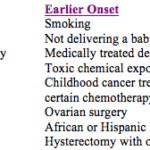
Remember BC (before Covid-19)? You could call up your doctor, dentist, optician, physical therapist, etc, and book an appointment. You could also go to work, travel, go to a restaurant, visit friends, and just live your life.
Time to change your mindset! Most people have been living in social isolation. Even though it is keeping you and the people around you safer, almost everyone has a serious case of cabin fever. “Let me out of here” seems to be the rallying cry. Things are so “not normal.”
That isolation has also affected access to healthcare for non-Covid-19 issues. It has become less accessible. My own routine check-ups with my primary care doctor, dentist, dermatologist, and physical therapist were all rescheduled months into the future. They may end up being rescheduled again. I bet that’s happened to you too.
I’ve also had to reschedule visits with my own patients due to the hospital’s efforts to limit the infection risk of non-emergency cases, and the reassignment of all staff to more Covid-19 related duties.
Lack of access to routine care and isolation is affecting a lot of people both physically and mentally. In this article I want to address some ways to stay happy, or at least happier, in this stressful time. Next week I’ll address some health hacks to help you stay well physically while access to your routine healthcare is less available.
I’m starting with mental health because if your mood is negative and you’re chronically stressed, it’s bad for your physical health. And social isolation, fear of infection, loss of loved ones, and economic downturn is enough to make anyone feel down in the dumps.
What can you do to stay positive? Since we’re all experiencing loss of control of so many aspects of our life, taking control of what you can control results in feeling calmer.
That’s why I suggest you begin with a schedule. Whether you are working, unemployed or retired, everyone works best with structure. It gives structure to the otherwise unstructured world.
Here are some things to include in your schedule:
- Wake up Time: Have a fixed wake up time. A consistent schedule helps your biorhythm stay on track.
- Meal times (includes preparation and eating times)
- Exercise times (more on that under physical health, but exercise lowers stress)
- Time(s) to meditate or pray (at least 10 minutes daily and ideally twice daily) There are meditation apps for this, many at no cost (examples are Insight Timer, Calm). Focusing on gratitude, even for the smallest things that are often taken for granted, can be grounding and help keep things in perspective.
- Three most important things: Write down only three things you need to get done today and how much time you’ll spend on each. No need to have a list longer than your arm. Knowing you’ll complete your list is good for your sense of self-esteem, and helps prevent overwhelm.
- Time to socialize: Call friends or family, six feet apart in person visits or walks, zoom or facetime visits with those who can’t be closer. Remember Barbra Streisand singing, “People, people who need people, are the luckiest people in the world.”
- Work time: If you’re working at home, the above need to be scheduled around work or vice versa
- Time for Hugs: If you live with a partner or children, and you’re all well, take time for a nice long hug. It gets oxytocin, our feel-good hormone, going and we all need the human contact in this time of social distancing
- Step outside: Being outside quiets the fight-or-flight response and calms the nervous system. When you begin to feel tense, stepping outside for a few minutes can be a salve for the tenseness your feeling
- Do Something to Help Others: Check in on a neighbor, show kindness, share helpful information. The act of helping others helps the helper
- Relax time before bed: Take a warm bath, read a good book, watch a funny movie, talk, with a good friend, or listen to calming music such as my award-winning sleep and relax CDs
- Limit the News to a small, fixed amount of time and definitely don’t watch before bedtime. The last thing you listen to or think about is what your subconscious thinks about all night while you sleep
- Bedtime: Have a fixed bedtime. The structure will be calming, give you a sense of control, and help your body be ready for sleep.
- Focus on Gratitude: Write down three things you are grateful for just before bedtime and leave that list on next to your bed on your nightstand. You’ll think about it while you sleep, and focusing on gratitude will help you realize there is a lot to be grateful for, even during this difficult time.
The act of setting up your calendar can give you a sense of control. It can also help with isolation by scheduling some activities with friends and family either virtually or in person with social distancing. And focusing on what you can control and what you are grateful for helps you realize there is a lot to be thankful for even during this difficult time.
Next week, I’ll share with you some thoughts on how to control of your physical health. Until then, stay well.



